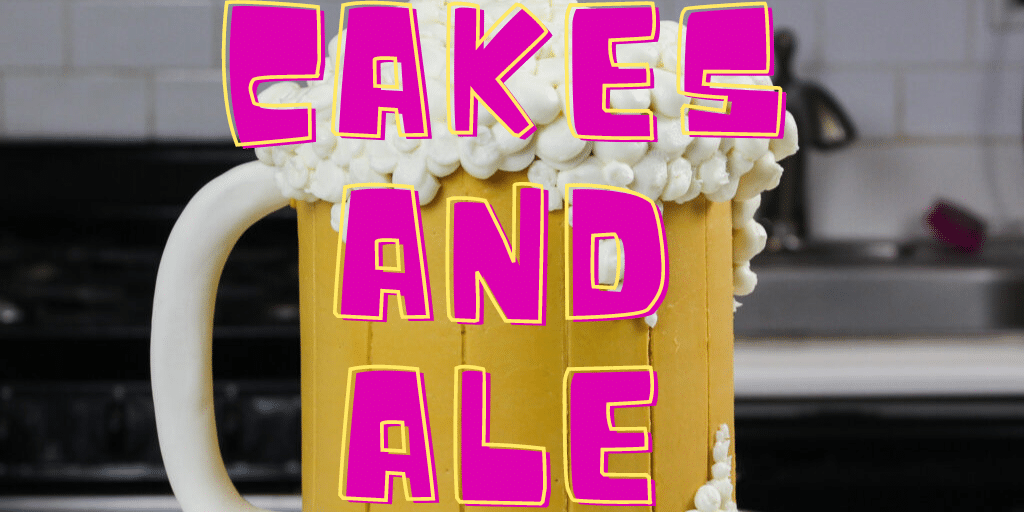So what does “cakes and ale” mean as an idiom? Shakespeare’s enduring legacy is marked not only by his mastery of language and the depth of his characters but also by his ability to encapsulate profound themes within seemingly simple phrases. One such phrase that has resonated through the ages is “cakes and ale.” It’s a phrase from his works, symbolising the fleeting nature of earthly pleasures. Beyond its literal reference to indulgence, it serves as a commentary on the universal human inclination towards joy, the tension between societal expectations and personal desires, and an existential reflection on life’s impermanence.
This seemingly innocuous expression, often dismissed as a mere reference to indulgence, serves as a rich tapestry woven into the intricate fabric of Shakespearean literature, embodying layers of meaning that delve into the human condition, societal norms, and the transience of pleasure. The phrase “cakes and ale” in the play transcends its apparent simplicity, offering a nuanced exploration of human nature, societal expectations, and existential reflections. Through the use of this seemingly commonplace expression Shakespeare invites readers and audiences to contemplate the delicate balance between virtue and indulgence, the transient nature of pleasure, and the universal human pursuit of joy amid life’s challenges.
Origin of “cakes and ale”
The phrase “cakes and ale” appears in several of Shakespeare’s works, notably in the play “Twelfth Night.” In Act 2, Scene 3, Sir Toby Belch uses it in a conversation with Sir Andrew Aguecheek, stating, “Dost thou think, because thou art virtuous, there shall be no more cakes and ale?” Historically, cakes and ale were associated with festivities and celebrations, highlighting the temporal nature of pleasure. This phrase captures the essence of indulgence and serves as a commentary on the human inclination to seek pleasure and revelry despite life’s challenges.
Beyond its literal meaning, “cakes and ale” also serves as a tool for Shakespeare to comment on societal norms and expectations. The phrase can be interpreted as a subtle critique of puritanical attitudes prevalent in Elizabethan society, where excessive virtue and abstinence were often upheld as moral ideals.

Cakes and ale
Symbolism of “cakes and ale”
“Cakes and ale” serves as a symbolic representation of the fleeting joys and transient nature of earthly pleasures. In a world filled with hardships and uncertainties, Shakespeare employs this metaphor to emphasize the inevitability of seeking solace and joy in simple, ephemeral pleasures. The phrase suggests that, despite life’s complexities, individuals are drawn to moments of celebration and mirth, seeking respite in the sweetness of cakes and the conviviality of ale.
“Cakes and ale” in the media
The phrase “cakes and ale” has left its imprint on various forms of media, including literature, music, and film, where its nuanced meanings have been explored and interpreted.
- Literature:
“Cakes and Ale” by W. Somerset Maugham: This novel, published in 1930, takes its title from Shakespeare’s phrase. Maugham’s work delves into the complexities of human relationships and societal expectations, echoing the themes encapsulated in the original Shakespearean expression.
- Music:
“Cakes and Ale” by Clannad: This Irish band released an album titled “Magical Ring” in 1983, featuring a track named “Cakes and Ale.” While the lyrics don’t explicitly reference Shakespeare’s phrase, the title suggests a connection to themes of joy and celebration.
- Film:
“Cakes and Ale” (1930): Based on the novel by W. Somerset Maugham, this film adaptation explores the literary and social themes present in the source material. It provides a visual interpretation of the phrase’s significance within the context of human relationships and societal norms.
“Cakes and Ale – Afternoon Tea” (2017): This short film, directed by Thomas Tudor, uses the phrase in its title to evoke a sense of traditional British culture, connecting the idea of cakes and ale with the quintessential afternoon tea experience.
- Television:
“Cakes and Ale: The Golden Age of British Pathe News” (2004): A documentary series that uses the phrase in its title, this work explores the historical significance and cultural impact of British Pathe News, offering a metaphorical link to the richness of both visual and culinary delights.
- Theatre:
“Cakes and Ale” (1992): A play by Hugh Whitemore, this theatrical work weaves together themes of love, literature, and societal expectations. Although not a direct adaptation of Maugham’s novel, the title suggests an exploration of similar thematic elements.
These instances across various media demonstrate the enduring allure and adaptability of Shakespeare’s phrase. Whether serving as a direct reference or a subtle allusion, “cakes and ale” continues to be a source of inspiration for artists exploring the complexities of human experience and the pursuit of joy amid life’s challenges.
Synonyms for “cakes and ale”
- Pleasures
- Enjoyments
- Festivities
- Mirth and indulgence
- Amusements and conviviality
- Delights
- Merriment
- Revelry
- Gratification
- Joys
- Merrymaking
- Celebration




Leave a Reply
Want to join the discussion?Feel free to contribute!